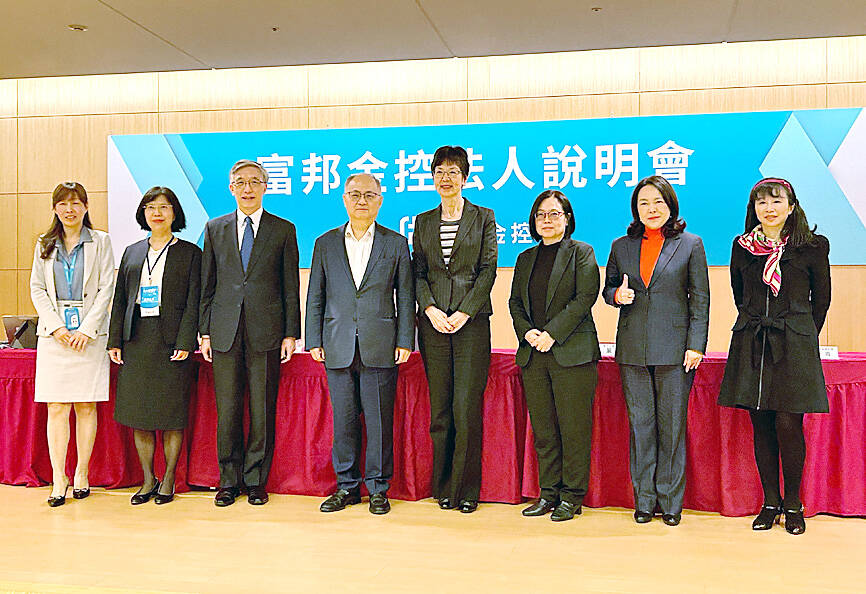Fubon Financial Holding Co (富邦金控) at an earnings conference yesterday said it is well-positioned to adopt the new IFRS 17 international accounting rules next year, thanks to its stable profitability and financial health.
The conglomerate’s flagship unit, Fubon Life Insurance Co (富邦人壽), would have no difficulty complying with the new system, the goals of which are to provide a more economic valuation of insurance assets and liabilities, increase comparability across companies and improve transparency, Fubon Financial said.
Notably, valuations of assets and liabilities would be based on the market, rather than historic or book value, the company said.

Photo: CNA
Fubon Life last year generated a record net income of NT$102.66 billion (US$3.11 billion) on the back of stock rallies in Taiwan and overseas, although bond holdings incurred losses of NT$444 million, it said.
The firm’s unrealized gains amounted to NT$90 billion in late December last year, but eased to NT$70 billion last month due to global stock routs, it added.
Fubon Financial president Jerry Harn (韓蔚廷) said the conglomerate would adopt a cautious strategy this year in dealing with market volatility.
“US President Donald Trump appears flexible, but [is] unpredictable over his trade policy,” Harn said. “It is better to raise cash positions and join the market when investment opportunities arise.”
Cash holdings rose NT$50.4 billion to NT$245.2 billion last year, company data showed.
Altogether, the insurance unit saw local shares generate NT$154.6 billion of profit last year, soaring 2.35 times from a year earlier and suggesting an annual return of 24.76 percent.
Fubon Financial reported a net profit of NT$150.82 billion last year, with earnings per share of NT$10.77.
Harn said the company would decide later on dividends, which would reflect last year’s earnings improvement and potential capital needs for future development.
In related news, O-Bank Co (王道商業銀行) yesterday said its office in Singapore would begin operations next quarter to tap into business opportunities in ASEAN markets.
The bank’s representative office in Sydney, Australia, is also seeking to upgrade into a banking branch, O-Bank president Elton Lee (李芳遠) said.
The bank reported a record profit of NT$3.89 billion last year, with earnings per share of NT$1. Its loan-to-deposit ratio grew from 68.37 percent in 2023 to 71.38 percent, while net interest income margin increased 5 basis points to 0.81 percent.
Loans to consumers and small enterprises underpinned profit growth, but bad loan ratios remained low at 0.12 percent, suggesting robust asset quality, and is favorable for the bank’s bid to become a boutique lender in Taiwan’s crowded banking market.

POWERING UP: PSUs for AI servers made up about 50% of Delta’s total server PSU revenue during the first three quarters of last year, the company said Power supply and electronic components maker Delta Electronics Inc (台達電) reported record-high revenue of NT$161.61 billion (US$5.11 billion) for last quarter and said it remains positive about this quarter. Last quarter’s figure was up 7.6 percent from the previous quarter and 41.51 percent higher than a year earlier, and largely in line with Yuanta Securities Investment Consulting Co’s (元大投顧) forecast of NT$160 billion. Delta’s annual revenue last year rose 31.76 percent year-on-year to NT$554.89 billion, also a record high for the company. Its strong performance reflected continued demand for high-performance power solutions and advanced liquid-cooling products used in artificial intelligence (AI) data centers,

SIZE MATTERS: TSMC started phasing out 8-inch wafer production last year, while Samsung is more aggressively retiring 8-inch capacity, TrendForce said Chipmakers are expected to raise prices of 8-inch wafers by up to 20 percent this year on concern over supply constraints as major contract chipmakers Taiwan Semiconductor Manufacturing Co (TSMC, 台積電) and Samsung Electronics Co gradually retire less advanced wafer capacity, TrendForce Corp (集邦科技) said yesterday. It is the first significant across-the-board price hike since a global semiconductor correction in 2023, the Taipei-based market researcher said in a report. Global 8-inch wafer capacity slid 0.3 percent year-on-year last year, although 8-inch wafer prices still hovered at relatively stable levels throughout the year, TrendForce said. The downward trend is expected to continue this year,

Vincent Wei led fellow Singaporean farmers around an empty Malaysian plot, laying out plans for a greenhouse and rows of leafy vegetables. What he pitched was not just space for crops, but a lifeline for growers struggling to make ends meet in a city-state with high prices and little vacant land. The future agriculture hub is part of a joint special economic zone launched last year by the two neighbors, expected to cost US$123 million and produce 10,000 tonnes of fresh produce annually. It is attracting Singaporean farmers with promises of cheaper land, labor and energy just over the border.

US actor Matthew McConaughey has filed recordings of his image and voice with US patent authorities to protect them from unauthorized usage by artificial intelligence (AI) platforms, a representative said earlier this week. Several video clips and audio recordings were registered by the commercial arm of the Just Keep Livin’ Foundation, a non-profit created by the Oscar-winning actor and his wife, Camila, according to the US Patent and Trademark Office database. Many artists are increasingly concerned about the uncontrolled use of their image via generative AI since the rollout of ChatGPT and other AI-powered tools. Several US states have adopted